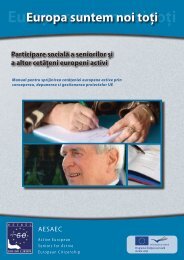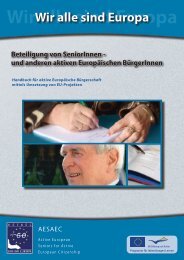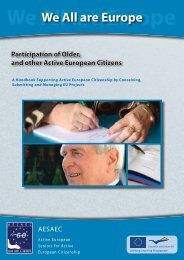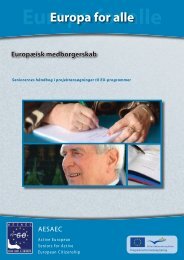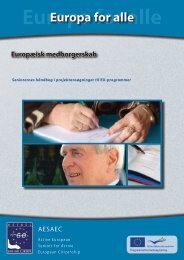We All are Europe - AESAEC
We All are Europe - AESAEC
We All are Europe - AESAEC
Create successful ePaper yourself
Turn your PDF publications into a flip-book with our unique Google optimized e-Paper software.
Exercise / Reflection / Research / Discussion<br />
In case you have already decided to apply for a specific project under one of the EU programmes<br />
please use tables A) and B) above for shaping and designing the partnership you need to implement<br />
the project.<br />
To find appropriate partners please follow the recommendations in table C) and check the following<br />
databases to gauge their usefulness:<br />
http://partbase.programkontoret.se<br />
www.bond.org.uk<br />
www.eurodesk.org/edesk/EUToolbox.dogo=7<br />
www.leonardo.org.uk/partnersearch<br />
http://crm.formez.it/crm/ricerca_partner/index.php<br />
According to the Survival Kit, developed as part of the Socrates programme, “activities that help in<br />
building a team” <strong>are</strong> …<br />
- getting to know each other as people<br />
- getting to know each other as professionals<br />
- getting to know the specific skills of each partner<br />
- getting to know the motives of the participants<br />
wishing to work in the project<br />
- getting to know the motives of each institution<br />
wishing to work in the project<br />
- giving the team a name<br />
- defining the main concepts and aims of the project<br />
- setting the evaluation criteria and methods<br />
- working with motivated and committed individuals<br />
and institutions<br />
- clearly defining roles and responsibilities<br />
- agreeing how to address conflict situations<br />
- sharing the ownership of the project<br />
- agreeing on basic rules for teamwork<br />
- reflecting on the work and progress of the team<br />
- using a suitable communication system<br />
- employing variable working methods at the meetings<br />
- recognising and sharing individual expertise<br />
- encouraging reserved members<br />
- celebrating milestones<br />
- dedicating enough time to social events<br />
- preventing isolation - through politics, age, economic<br />
circumstances, abilities relevant to the project, linguistic<br />
skills<br />
- guiding and leading – showing sensitivity towards the<br />
feelings of others<br />
Please discuss whether or not you agree or disagree with this list Is anything missing Is it possible,<br />
or even advisable, to rank these recommendations<br />
6.1.2. Cultural and language issues<br />
Listen / Read / Exercise<br />
Developing trust, knowledge and understanding within a group of transnational partners is essential<br />
for effective working. However, with cultural differences, geographical distances and language barriers<br />
this is one of the greatest challenges.<br />
The understanding of cultural differences, i.e. ways of doing business, levels of formality etc., together<br />
with having an open mind and a willingness to try different approaches is essential when<br />
building an effective transnational partnership. Depending on the countries involved, cultural differences<br />
can include distinctions at many levels, such as:<br />
- legal and financial systems<br />
- religious beliefs<br />
- holiday times and public holidays<br />
- levels of formality.<br />
What other kind of cultural differences could influence your project’s implementation Do you have<br />
your own experiences in connection with this<br />
100




